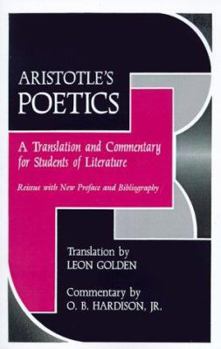Aristotle's Poetics: A Translation and Commentary for Students of Literature
Select Format
Select Condition 
Book Overview
"The reprint edition will be most welcome to classicists, comparatists, and students of literary theory. No existing translation of the Poetics even approaches the quality and accuracy of Leon... This description may be from another edition of this product.
Format:Paperback
Language:English
ISBN:0813007208
ISBN13:9780813007205
Release Date:February 1982
Publisher:Florida State University
Length:308 Pages
Weight:0.95 lbs.
Dimensions:0.9" x 5.6" x 8.0"
Customer Reviews
2 ratings
Tragedy Teaches Us Something About Life
Published by Thriftbooks.com User , 16 years ago
I read these works for a graduate seminar on Aristotle. Poetry appeals to human passions and emotions. Powerful beautiful language and metaphor really appeal to emotion. This idea really disturbed Plato, who takes on Homer in the Republic. Plato thought that early Greek poetry portrays a dark world; humans are checked by negative limits like death. Tragedy has in it a character of high status brought down through no fault of his own. Plato says this is unjust. Republic is about ethical life and justice. It starts with the premises that might makes right and then moves onto the idea much like modern religions that justice comes in the afterlife. Plato hates the idea that in tragedy bad things can happen to good people. He wanted to ban tragedy because he found it demoralizing. Aristotle's Poetics is a defense against Plato's appeal to ban tragedy. Tragedy was very popular in Greek world so Aristotle asks can it be wrong to ban it? Yes, it is wrong thus he decides to study it. Plato says Poetry is not a technç because the poets are divinely inspired. Aristotle disagrees Poetics is a handbook for playwrights. Mimçsis= "representation or imitation." Plato uses it in speaking of painting, thus art is imitation. Another meaning is to mimic, like actors mimicking another person. Plato and Aristotle use it to mean psychological identification like how we get absorbed in a movie as if the action were real, eliciting emotions from us. We suspend reality for a while. Aristotle says this is natural in humans; we do this as children, we mimic. If imitation is important for humans then tragic poetry is worthwhile for Aristotle to study. Definition of tragedy- "Through pity and fear it achieves purification from such feelings. This is a famous controversial line. Katharsis= "pity and fear" thus the purpose of tragedy is to purge katharsis. Katharsis can also mean purification or clean. There is a debate if it means clarification, through which we can come to understand katharsis. Aristotle thinks tragedy teaches us something about life. Tragedy is an elaboration on Aristotle's idea that good or virtuous people sometimes get unlucky and in the end, they get screwed. Tragedy shows this so we can learn to get by when life screws us. The whole point of tragedy is action over character. Action is the full story of the poem like the Iliad. Character is only part of the action. Aristotle distinguishes between poetry and history. Poetry is concerned with universals, history is concerned with particulars. I recommend Aristotle's works to anyone interested in obtaining a classical education, and those interested in philosophy. Aristotle is one of the most important philosophers and the standard that all others must be judged by.
Excellent Commentary on Aristotle's Poetics
Published by Thriftbooks.com User , 21 years ago
For my money, it is the commentary by O. B. Hardison, Jr. that is the selling point for this text. Students of literature and creative writing will benefit from Hardison's insightful commentary, which makes up the larger part of the book.






